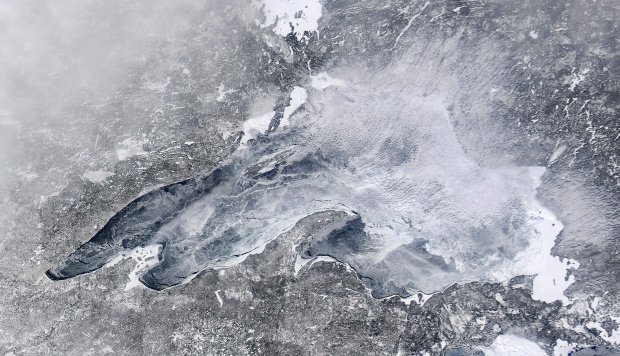The Great Lakes Are Still Frozen And That Isn't Exactly A Bad Thing
By Chuck Sudo in News on Apr 15, 2014 8:30PM

NASA/MODIS
It was only last month that the Great Lakes were 90 percent covered in ice and while we wait for our sputtering spring to finally take hold, as of April 10, 48 percent of the freshwater reserve’s 96,000 square miles remained frozen. Typically it takes a couple months for the ice to melt (and the average ice cover is around 40 percent) but because 2013-14 was a very historic winter, the effects of all this ice in the Great Lakes this late in the year could have effects, both positive and negative, on shipping, water levels, recreational activities on the lakes and the ecosystem for months.
Those effects on shipping are already being felt. The Soo Locks separating Lake Superior from the lower Great Lakes opened March 25 but it took another 11 days and several ice breakers before the first commercial ship made its way through the locks on the still-frozen lake. Only three coal hauls were loaded for passage on the lakes last month. Production at the U.S. Steel plant in Gary, Ind. was scaled back significantly as iron ore shipments couldn’t pass through the ice cover on Lake Michigan.
The ice cover has also resulted in large numbers of ducks dying because they couldn’t dive into the water to feed. Colder waters as a result of the ice cover could trigger delayed seasonal shifts, lingering cold water and later migrations of freshwater fish species to their normal spawning grounds. Shedd Aquarium research scientist Solomon David told Michigan Radio the later spawning could result in smaller and weaker fish as the region prepares for winter 2014-15.
There are benefits to the remaining ice cover. Water levels along the Great Lakes are at their highest marks in years, which can help plant and animal diversity along coastal wetlands and allow shipping companies to haul heavier loads at less cost across the Great Lakes, without having to dredge out the bottoms of the lakes. But the higher water levels may only be temporary and could rise or fall depending on how much rain the Great Lakes receive during the summer months. A hot, dry summer could negate all the gains the Great Lakes are currently making from the melting ice.